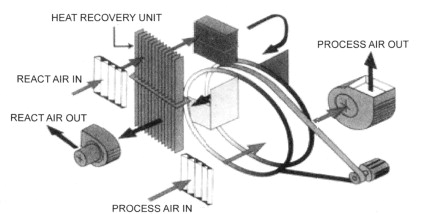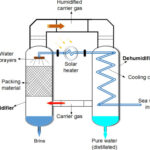When air is cooled below the dew point temperature, Tdewpoint, condensation occurs and moisture is removed from the air stream. The exiting air stream is at a lower temperature and humidity ratio than the incoming air stream. The cooling to condense water from the air is called latent cooling or dehumidification. Thus, this process includes both sensible and latent cooling. The total cooling is the sum of the latent and sensible cooling. The process is shown schematically below.

On psychrometric chart, this process is represented as line sloping downward and to the left. This process is assumed to occur as simple cooling first and then condensation. While the moisture is condensing the air is assumed to remain saturated.
This process is used in air-conditioning systems operating in hot, humid climates. It is accomplished by using a cooling coil with a surface temperature below the dew-point temperature of water vapor in air. Typical cooling coils in air conditioning systems operate at approximately 40° – 50°F, below the dew-point temperature of typical indoor air conditions. The calculations are identical to those for heating and humidifying the only difference being that the initial state (state 1) is the warmer more humid state. As before, the total heat change (Q or q) in going from the initial to the final condition can be broken into a sensible and latent heat portion.
This process is used in air-conditioning systems operating in hot, humid climates. Typical cooling and dehumidifying process include chilled water and refrigerant cooling coils which condition re-circulated room air or mixtures of re-circulated air and outdoor air which is introduced for ventilation. The cooling coil shall have a surface temperature below the dew-point temperature of water vapor in air for effective condensation.
Observable characteristics of a cooling and dehumidifying process are:
1. dry bulb temperature decreases
2. humidity ratio decreases
3. vapor pressure decreases
4. dew point temperature decreases
5. wet bulb temperature decreases
6. enthalpy decreases (there is a decrease in the energy level and with the loss of energy, condensation occurs)
7. relative humidity increases


